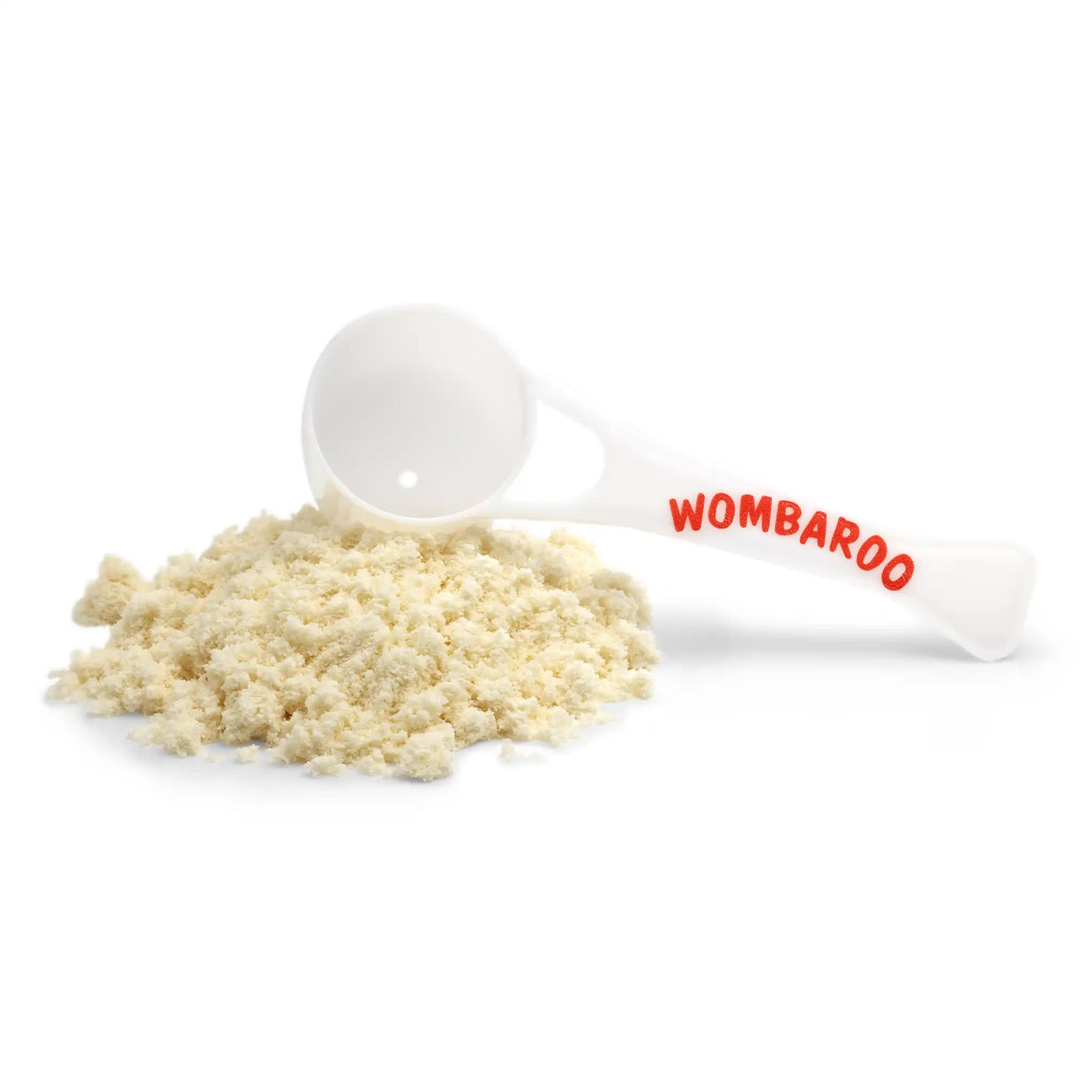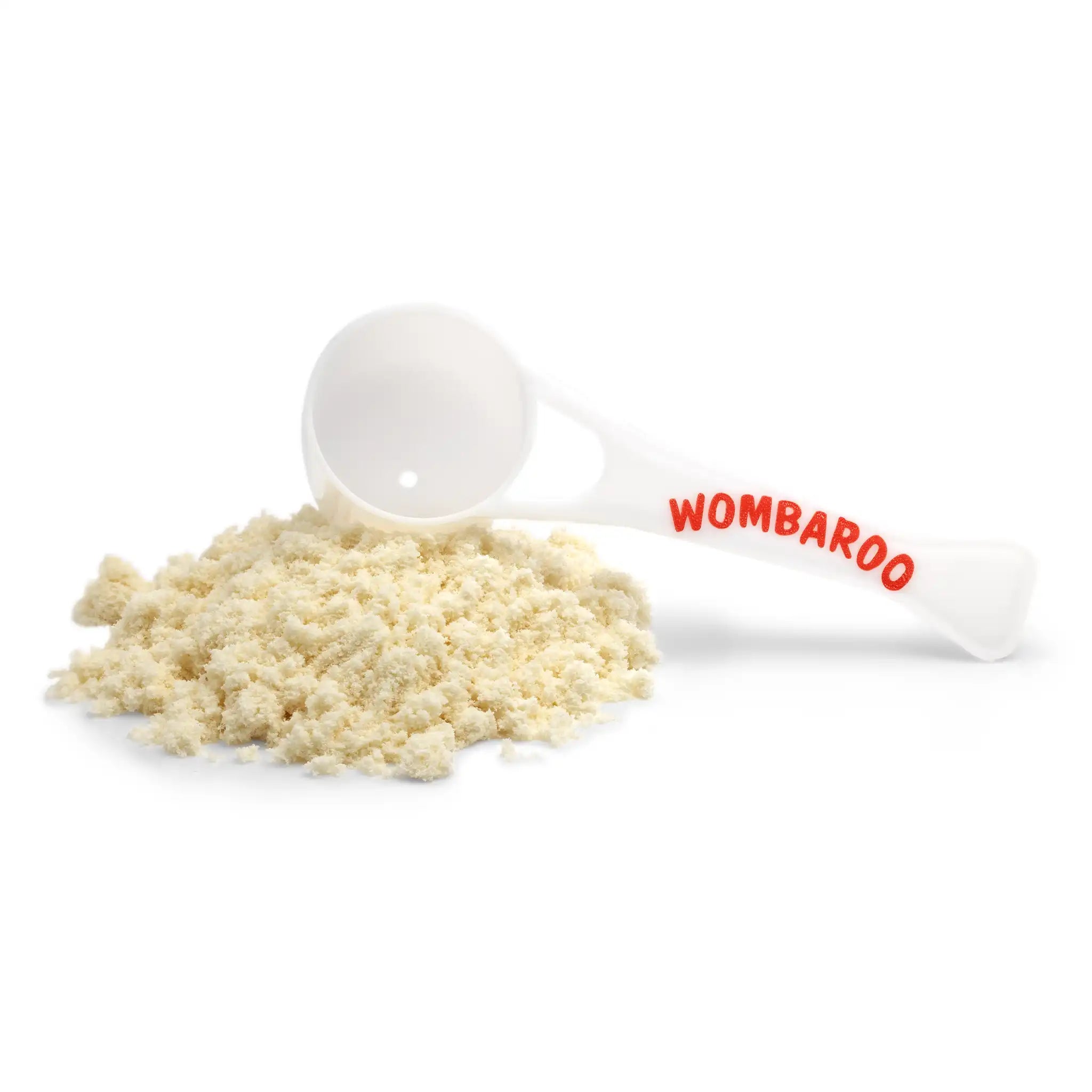Your cart (0)
Your cart is empty
Tax included and shipping calculated at checkout
Free Standard Shipping On U.S. Orders Over $100
Free Standard Shipping On U.S. Orders Over $100
Drawer menu
Tax included and shipping calculated at checkout
Subtotal: $0.00
This website uses cookies to ensure you get the best experience on your device.






Stage 2 is milk substitute for possum and glider joeys with more than 80% of their time in the mother’s pouch completed (babies usually spend a total of about 2 months in the pouch). Joeys at this stage have short to dense fur, with eyes fully opened and erect ears. Joeys spend some time out of the pouch and may consume solid food. Their feces are soft to firm dark pellets.
Formulated to match the composition of late lactation possum milk, the formula has high energy & fat content to support the increased activity levels of older joeys and high protein to aid growth.
Impact Colostrum Supplement may be fed to enhance the immune system.
Australian made high-quality milk replacers. Wombaroo’s team of experts has worked since 1984 to develop scientifically backed premium milk replacers and food for exotic animals. Wombaroo has developed products specifically for zoos and captive breeding programs to support wildlife conservation projects worldwide.
To make 100mL of milk: Mix 3 ½ scoops (25g) of powder to 80mL of warm water.
To make 1 liter of milk: Mix 250g of powder with 800mL of warm water.
Add about half the water to the powder first and mix to a paste. Then make up with the remaining water and mix thoroughly. Pre-boil water to ensure that it is sterilized. If the water is too hot, it can cause the milk to curdle. If it is too cold then it will be difficult to disperse the powder. Wombaroo Contains elevated fat levels, so the milk needs to be well mixed to prevent it from separating out. An electric whisk can be used for mixing larger quantities.
Milk can be refrigerated for up to one day or frozen for up to 2 weeks. You can save time by making larger quantities and storing it frozen in small portions (e.g. ice cube trays), so that the required daily feed volumes can be easily thawed out. Once thawed, discard any unused milk, and wash feeding utensils thoroughly.
Warm milk to about 86°F (30°C) and feed using a bottle and nipple. A syringe or eye dropper may be required for pygmy possums or small gliders. Feed around 4 times per day for joeys with less than 80% of their pouch life completed, reducing to twice a day after full pouch emergence, when sufficient solid food is being consumed. As the young progress, they can be taught to lap milk from a shallow bowl and may be offered a single feed at night, alongside solid food.
If the joey shows signs of dehydration (e.g., during hot weather), give extra drinks of water between feedings. Joeys can dehydrate rapidly if not maintained under optimum conditions. Water should always be available to them once joeys begin to emerge from the pouch and become more active. Joeys should also have access to browse fresh and solid foods at this stage. Consult your veterinarian or experienced carer for further information about caring for and feeding young possums.
See back of the box for dosing instructions.
Different species of possums and gliders grow at different rates. Weigh joeys regularly to verify weight gains and determine the volume of milk to feed. Overfeeding milk can cause diarrhea so feed the volume suggested by the dosing instructions on the back of the box.
Once a possum leaves the pouch, it begins to eat more solid food and becomes less reliant on milk. The amount of milk fed will depend on the quantity and nutritional value of other food eaten. Possum joeys should be weaned at about 1.3 times the joey’s pouch life. For example, a Common Brushtail Possum has a pouch life of 150 days, so they can be weaned by 200 days. Possums and gliders should be weaned on to solid foods that form part of the natural diet of the adult of the species. High Protein Supplement should be used as a nutritional supplement if feeding fruit and vegetables.
Whole milk solids (low lactose), whey protein, casein, glucose, vegetable oils, omega-3 and omega-6 fatty acids, maltodextrin, vitamins A, B1, B2, B3, B5, B6, B9, B12, C, D3, E, K, biotin, choline, calcium, phosphorus, potassium, sodium, magnesium, zinc, iron, manganese, copper, iodine, selenium.
Analysis
!
!
Stage 2 is milk substitute for possum and glider joeys with more than 80% of their time in the mother’s pouch completed (babies usually spend a total of about 2 months in the pouch). Joeys at this stage have short to dense fur, with eyes fully opened and erect ears. Joeys spend some time out of the pouch and may consume solid food. Their feces are soft to firm dark pellets.
Formulated to match the composition of late lactation possum milk, the formula has high energy & fat content to support the increased activity levels of older joeys and high protein to aid growth.
Impact Colostrum Supplement may be fed to enhance the immune system.
Australian made high-quality milk replacers. Wombaroo’s team of experts has worked since 1984 to develop scientifically backed premium milk replacers and food for exotic animals. Wombaroo has developed products specifically for zoos and captive breeding programs to support wildlife conservation projects worldwide.
To make 100mL of milk: Mix 3 ½ scoops (25g) of powder to 80mL of warm water.
To make 1 liter of milk: Mix 250g of powder with 800mL of warm water.
Add about half the water to the powder first and mix to a paste. Then make up with the remaining water and mix thoroughly. Pre-boil water to ensure that it is sterilized. If the water is too hot, it can cause the milk to curdle. If it is too cold then it will be difficult to disperse the powder. Wombaroo Contains elevated fat levels, so the milk needs to be well mixed to prevent it from separating out. An electric whisk can be used for mixing larger quantities.
Milk can be refrigerated for up to one day or frozen for up to 2 weeks. You can save time by making larger quantities and storing it frozen in small portions (e.g. ice cube trays), so that the required daily feed volumes can be easily thawed out. Once thawed, discard any unused milk, and wash feeding utensils thoroughly.
Warm milk to about 86°F (30°C) and feed using a bottle and nipple. A syringe or eye dropper may be required for pygmy possums or small gliders. Feed around 4 times per day for joeys with less than 80% of their pouch life completed, reducing to twice a day after full pouch emergence, when sufficient solid food is being consumed. As the young progress, they can be taught to lap milk from a shallow bowl and may be offered a single feed at night, alongside solid food.
If the joey shows signs of dehydration (e.g., during hot weather), give extra drinks of water between feedings. Joeys can dehydrate rapidly if not maintained under optimum conditions. Water should always be available to them once joeys begin to emerge from the pouch and become more active. Joeys should also have access to browse fresh and solid foods at this stage. Consult your veterinarian or experienced carer for further information about caring for and feeding young possums.
See back of the box for dosing instructions.
Different species of possums and gliders grow at different rates. Weigh joeys regularly to verify weight gains and determine the volume of milk to feed. Overfeeding milk can cause diarrhea so feed the volume suggested by the dosing instructions on the back of the box.
Once a possum leaves the pouch, it begins to eat more solid food and becomes less reliant on milk. The amount of milk fed will depend on the quantity and nutritional value of other food eaten. Possum joeys should be weaned at about 1.3 times the joey’s pouch life. For example, a Common Brushtail Possum has a pouch life of 150 days, so they can be weaned by 200 days. Possums and gliders should be weaned on to solid foods that form part of the natural diet of the adult of the species. High Protein Supplement should be used as a nutritional supplement if feeding fruit and vegetables.
Whole milk solids (low lactose), whey protein, casein, glucose, vegetable oils, omega-3 and omega-6 fatty acids, maltodextrin, vitamins A, B1, B2, B3, B5, B6, B9, B12, C, D3, E, K, biotin, choline, calcium, phosphorus, potassium, sodium, magnesium, zinc, iron, manganese, copper, iodine, selenium.
Analysis
!
